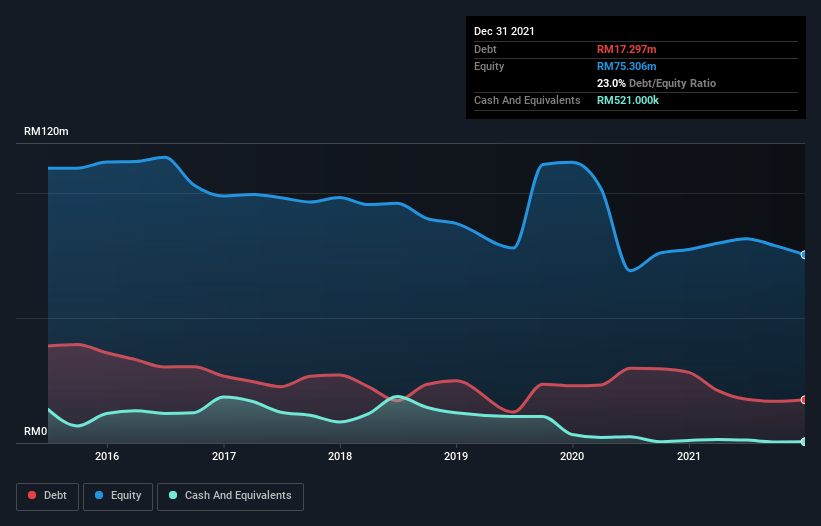- Malaysia
- /
- Energy Services
- /
- KLSE:HANDAL
We Think Handal Energy Berhad (KLSE:HANDAL) Has A Fair Chunk Of Debt

Warren Buffett famously said, 'Volatility is far from synonymous with risk.' When we think about how risky a company is, we always like to look at its use of debt, since debt overload can lead to ruin. Importantly, Handal Energy Berhad (KLSE:HANDAL) does carry debt. But the more important question is: how much risk is that debt creating?
Why Does Debt Bring Risk?
Debt and other liabilities become risky for a business when it cannot easily fulfill those obligations, either with free cash flow or by raising capital at an attractive price. In the worst case scenario, a company can go bankrupt if it cannot pay its creditors. However, a more common (but still painful) scenario is that it has to raise new equity capital at a low price, thus permanently diluting shareholders. Having said that, the most common situation is where a company manages its debt reasonably well - and to its own advantage. The first thing to do when considering how much debt a business uses is to look at its cash and debt together.
Check out our latest analysis for Handal Energy Berhad
What Is Handal Energy Berhad's Debt?
The image below, which you can click on for greater detail, shows that Handal Energy Berhad had debt of RM17.3m at the end of December 2021, a reduction from RM28.2m over a year. However, it does have RM521.0k in cash offsetting this, leading to net debt of about RM16.8m.

A Look At Handal Energy Berhad's Liabilities
Zooming in on the latest balance sheet data, we can see that Handal Energy Berhad had liabilities of RM48.3m due within 12 months and liabilities of RM1.66m due beyond that. On the other hand, it had cash of RM521.0k and RM30.9m worth of receivables due within a year. So its liabilities outweigh the sum of its cash and (near-term) receivables by RM18.5m.
This deficit isn't so bad because Handal Energy Berhad is worth RM31.2m, and thus could probably raise enough capital to shore up its balance sheet, if the need arose. But it's clear that we should definitely closely examine whether it can manage its debt without dilution. The balance sheet is clearly the area to focus on when you are analysing debt. But you can't view debt in total isolation; since Handal Energy Berhad will need earnings to service that debt. So when considering debt, it's definitely worth looking at the earnings trend. Click here for an interactive snapshot.
In the last year Handal Energy Berhad had a loss before interest and tax, and actually shrunk its revenue by 24%, to RM58m. That makes us nervous, to say the least.
Caveat Emptor
While Handal Energy Berhad's falling revenue is about as heartwarming as a wet blanket, arguably its earnings before interest and tax (EBIT) loss is even less appealing. Indeed, it lost a very considerable RM5.7m at the EBIT level. Considering that alongside the liabilities mentioned above does not give us much confidence that company should be using so much debt. So we think its balance sheet is a little strained, though not beyond repair. We would feel better if it turned its trailing twelve month loss of RM5.0m into a profit. So to be blunt we do think it is risky. There's no doubt that we learn most about debt from the balance sheet. However, not all investment risk resides within the balance sheet - far from it. Case in point: We've spotted 3 warning signs for Handal Energy Berhad you should be aware of, and 2 of them make us uncomfortable.
Of course, if you're the type of investor who prefers buying stocks without the burden of debt, then don't hesitate to discover our exclusive list of net cash growth stocks, today.
If you're looking to trade Handal Energy Berhad, open an account with the lowest-cost platform trusted by professionals, Interactive Brokers.
With clients in over 200 countries and territories, and access to 160 markets, IBKR lets you trade stocks, options, futures, forex, bonds and funds from a single integrated account.
Enjoy no hidden fees, no account minimums, and FX conversion rates as low as 0.03%, far better than what most brokers offer.
Sponsored ContentValuation is complex, but we're here to simplify it.
Discover if Handal Energy Berhad might be undervalued or overvalued with our detailed analysis, featuring fair value estimates, potential risks, dividends, insider trades, and its financial condition.
Access Free AnalysisHave feedback on this article? Concerned about the content? Get in touch with us directly. Alternatively, email editorial-team (at) simplywallst.com.
This article by Simply Wall St is general in nature. We provide commentary based on historical data and analyst forecasts only using an unbiased methodology and our articles are not intended to be financial advice. It does not constitute a recommendation to buy or sell any stock, and does not take account of your objectives, or your financial situation. We aim to bring you long-term focused analysis driven by fundamental data. Note that our analysis may not factor in the latest price-sensitive company announcements or qualitative material. Simply Wall St has no position in any stocks mentioned.
About KLSE:HANDAL
Handal Energy Berhad
An investment holding company, primarily provides integrated crane and pipeline isolation services to the oil and gas industry in Malaysia.
Low and overvalued.
Market Insights
Community Narratives



